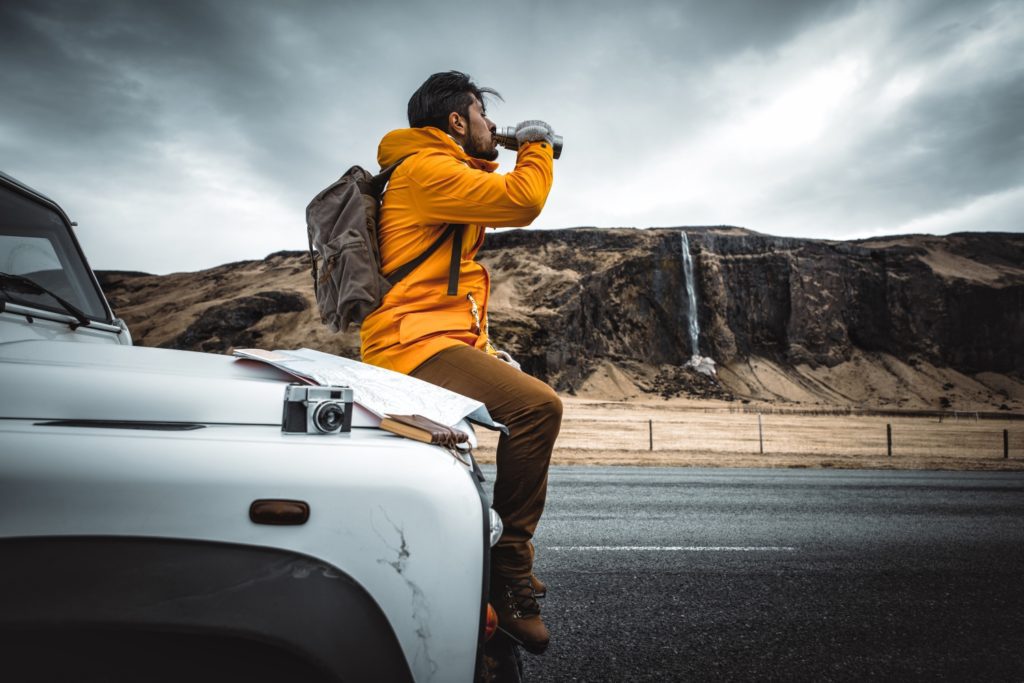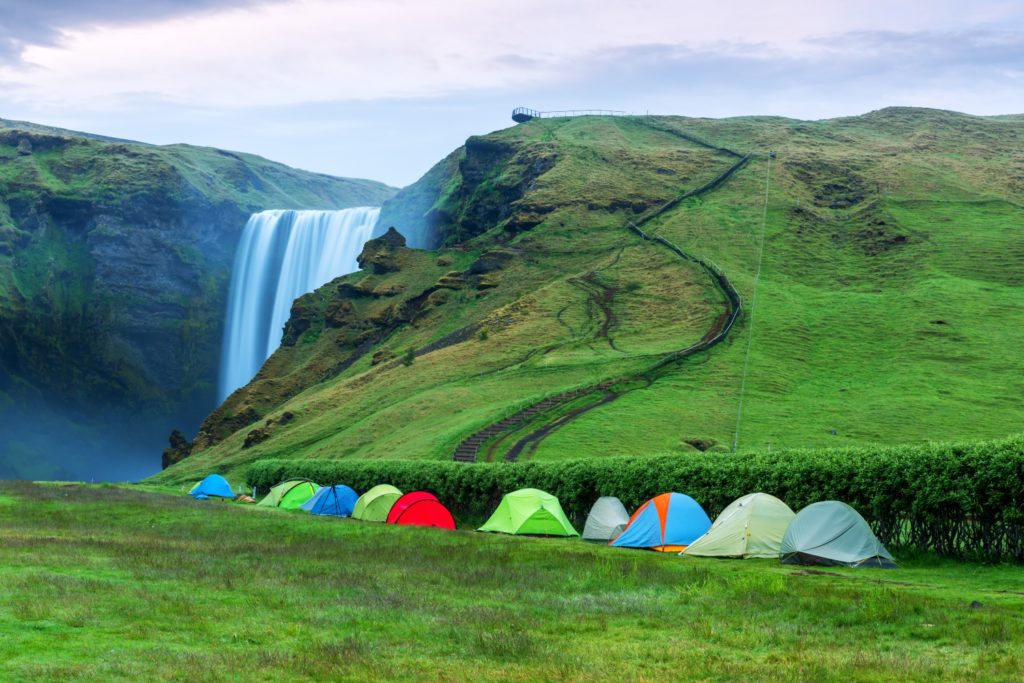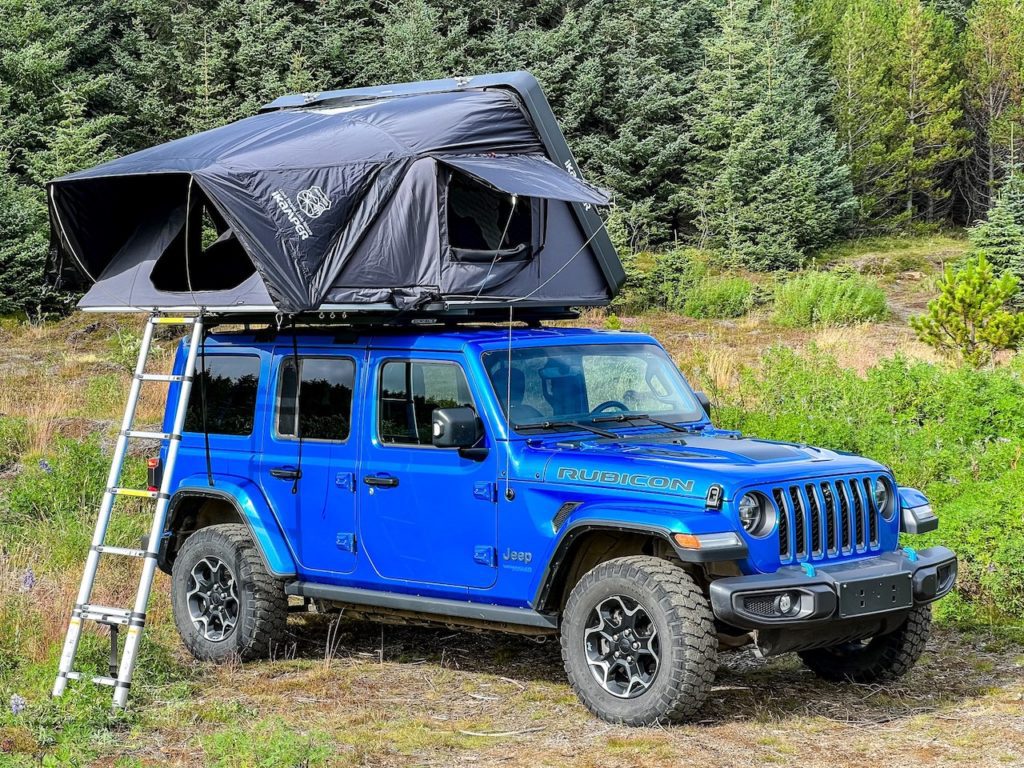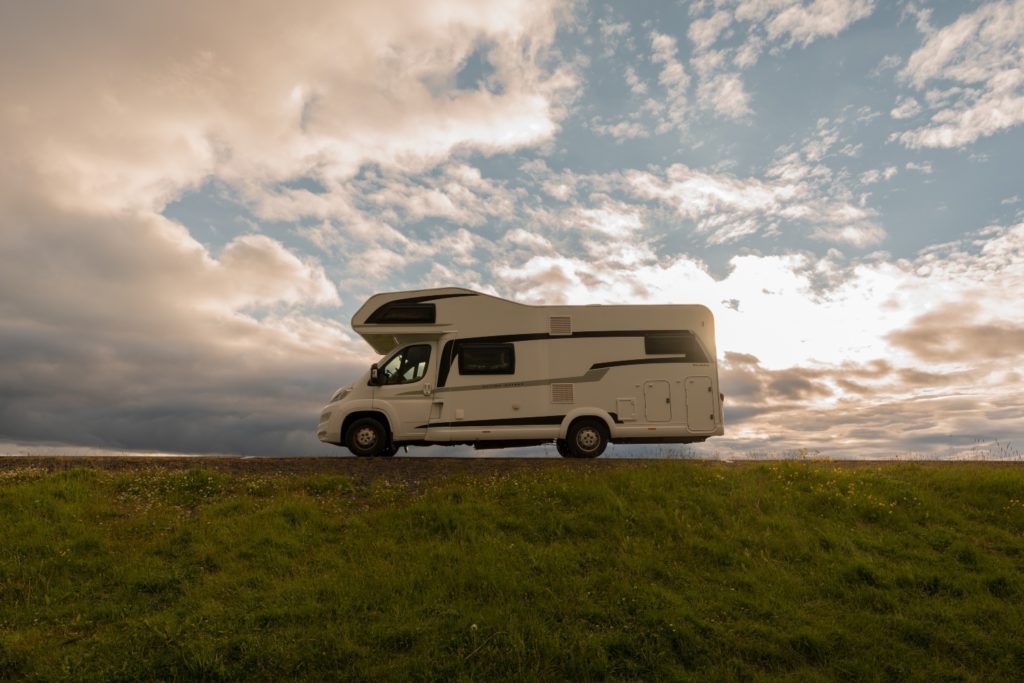Camping in Iceland is extremely popular among tourists and locals alike. It’s the perfect option for those looking to immerse themselves in the island’s incredible scenery, experience adventures in the great outdoors, enjoy the freedom of the open road, and make memories that will last a lifetime.
With over 200 campsites spread across the country, Iceland is ideally suited for camping – and it’s undoubtedly the most accessible, flexible, and affordable way to explore this beautiful country.
If you’re considering a camping trip in Iceland, it’s important to know that it can differ from camping in many other countries. So to make sure you’re fully prepared, and get the most from your trip, here’s our quick guide to everything you need to know before you set off on your great camping adventure.
1. The best time of year to go camping in Iceland
The weather in Iceland is typically at its best during the summer months when the days are long and light (May – September), with July and August being optimal for camping.
However, campsites can be more crowded during peak season, and the weather can still be famously unpredictable, so you’ll need to be well prepared. Make sure you book ahead and that your camping equipment and clothing are suitable for all four seasons in one day!
If your dream is to camp under the northern lights, then you’ll need to brave the colder season (mid-September to mid-April) and be limited to the campsites that remain open through the winter months.
While the days are much shorter and the weather can be extremely harsh, there are fewer tourists through the winter, and vehicle rentals are typically cheaper. You’ll need to rent a camper van or small motorhome specially equipped for winter weather and driving conditions to guarantee a warm, comfortable, and safe experience.
2. The best type of camping in Iceland

There are several ways to camp in Iceland, depending on what you want to experience during your trip – and your budget.
- Car hire and tent camping offer a truly authentic camping experience. It’s the cheapest camping option, highly popular in the summer, and provides excellent flexibility. It’s also possible to rent all the necessary equipment once you arrive in Iceland if you want to avoid the hassle of bringing everything from home.
The ever-changing Icelandic weather, especially in the winter, means you’ll need a waterproof tent suitable for extreme weather conditions and a 4-seasons sleeping bag to keep you warm if (when!) temperatures drop.
- Camper van camping has become very popular over the last few years due to the many benefits it offers over tent camping, including comfort, security, protection from the elements, no setting up or dismantling of tents, cooking facilities, and an electricity supply.
Camper van rental prices will vary depending on the season but typically come equipped with everything you’ll need for a stress-free road trip adventure.
- Motorhomes are generally much bigger than the average camper van and offer purpose-built, home-from-home comfort. They have the advantage of providing a fuller living space, including a shower, toilet, and more storage space – but these added benefits come with a higher price tag.
With the larger vehicles, driving and parking can be more challenging and limit your access to many attractions located off more minor roads. However, smaller motorhome rental options, available all year round, are highly versatile and ideal for a camping trip around Iceland.
It’s important to weigh the pros and cons of each type of camping to make sure you choose an option best suited to your needs and expectations.
3. Choosing a campsite in Iceland

Most of the campsites in Iceland are simple, wide-open fields with varying levels of facilities available. Typically, they don’t issue designated spots, so you can choose where to park and set up. You can also arrive when you like – with people coming and going at all hours, especially during the summer when it’s almost always daylight!
With over 200 campsites to select from, mainly located along the coast road and Ring Road, you will be spoilt for choice. To narrow down your selection, it’s a good idea to consider location, opening period, facilities, prices, and online reviews.
With so many things to see and do in Iceland, it’s worth researching ahead of time to guarantee you have somewhere to stay at every point along your camping journey – and that each campsite offers the facilities you need.
Look out for our December blog, where we list our selection of the 20 best campsites in Iceland to help you plan your 2023 camping trip.
4. Campsite costs and booking in advance
Campsites in Iceland typically charge 10–20€ per person per night (usually free for children), and most accept cash or credit card.
Some may charge extra fees for using facilities such as showers, washing machines, and dryers.
Campingcard Iceland can be a cheaper option if you plan to camp for more than a few nights. For a fixed fee of 159€ (165$), this card allows access to over 40 campsites in Iceland for 28 consecutive days – for two adults and two children. It also provides an app where you can buy the card, find eligible camping sites by region, view the campsites’ information, and get all the latest camping news.
In general, reserving your campsite place in advance is optional, but during the summer months, south Iceland campsites can get busy, so it is worth booking these ahead.
Motorhome and camper van rentals are limited throughout Iceland, especially the larger vehicles that accommodate families. Unfortunately, they also go up in price the closer you get to your travel dates, so it’s definitely best to book these as far in advance of your trip as possible.
5. What to pack for a camping trip in Iceland

If you opt to rent a camper van or motorhome, it should come ready-equipped with everything you need, or you’ll be able to rent these items from the vehicle rental company.
For tent camping, you’ll need a sturdy, weatherproof tent, all-weather sleeping bags, blankets, and a camping table and chairs. Again, these can all be rented once you arrive in Iceland, along with additional camping equipment.
Additionally, consider these key items:
- A large backpack and day pack
- Quick-dry towels
- Wind- and waterproof, thermal clothes, shoes/boots – layers are essential
- Hats, gloves, scarves, and socks
- Bathing suit
- Flip flops – particularly useful for communal showers!
- Sunglasses, sunscreen, and chapstick
- Sleeping mask for summer, head torch/flashlight for winter
- Toiletries
- Toilet paper and disposable bags
- Medical kit
- Pillows
- Pots and pans
- Plates, cups, and utensils
- Kettle
- Bottle and can openers
- Swiss knife
- Reusable water bottles
- Lighter/matches
- Gas stove and propane gas
- Portable USB charger (for mobile phones, cameras, etc.)
- Universal travel adapter
- GPS / quality map and guidebook
- Food and drinks – at least 2-3 days worth – plus a cooler for storage
- Playlists and music – essential for any road trip!
If this will be your first camping adventure, be sure to learn how to use any camping equipment in advance to save yourself any stress once you’ve set off on your grand adventure.
6. Iceland camping laws and wild camping
As with a trip anywhere in the world, it’s essential to respect the culture and country you’re visiting and be aware of any rules you need to follow during your stay.
With the sharp rise in visitor numbers to Iceland and to preserve the natural, fragile environment, legislation to regulate camping has become stricter. As a result, a new law was passed in 2015 via the Environment Agency of Iceland, making it illegal to wild camp in a tent, trailer, motorhome, camper van, or similar – including within Iceland’s National Parks.
You should only use the designated campsites to camp in Iceland. (The only exception is to have explicit permission, in writing, from the landowner to camp on their property.)
It is also strictly forbidden to light open fires in Iceland, including campfires. This is to avoid the high risk of wildfires and damage being caused to the delicate environment. However, if required, you can buy or rent a gas stove for cooking or find a campsite with kitchen facilities.
7. Keeping your trip within budget

One of the many reasons why camping in Iceland is so popular among tourists and locals is that it’s the most cost-effective way to explore and enjoy all the delights this stunning island offers.
However, everything else in Iceland is expensive, so it’s essential to plan ahead to guarantee you stay within budget and avoid any nasty surprises. For example:
- Stock up on food and drink items from budget supermarkets, such as Bonus and Krónan – which will be much cheaper than eating out or buying from smaller shops in more remote areas.
- Check out the ‘free food bins’ at campsites with kitchen facilities, which contain items left behind by other campers, including cooking oil, butter, jams, etc.
- Buy any alcohol at the duty-free shop when you arrive in Keflavík. The state runs liquor stores (Vínbúðin) throughout the country have limited opening hours (usually 11.00-18.00) and heavy taxes.
- Make use of public swimming pools for cheaper/free showers and indulgent hot springs, which can be found all over Iceland. Avoid the tourist traps where prices will be exorbitant!
- Rent a gas-friendly vehicle to save on fuel costs – remember you have the rental fee and travel insurance to factor in too.
- Don’t buy bottled water. Instead, buy or bring a refillable container that you can fill up at campsites, gas stations, and springs for free. The water quality in Iceland is super clean and drinkable.
8. Camping safety in Iceland
Iceland repeatedly ranks as one of the safest countries in the world, and camping here is perfectly safe. Being a small island, the crime rates are incredibly low, and there are no dangerous animals in Iceland that can seriously injure or kill you.
Nature is the most dangerous thing you’ll encounter – from extreme weather conditions to volcanic lava eruptions, boiling thermal hot springs, and avalanches. However, none of these pose a threat if you use your common sense, prepare properly, follow local guidelines, and use an experienced guide when visiting Iceland’s natural wonders.
So get out and explore the magical beauty of Iceland, but travel and camp smart.
Local information to stay safe:
- Icelandic Met Office weather forecast: https://en.vedur.is/weather/forecasts/areas/
- Driving in Iceland – road conditions: https://www.road.is
- Special alerts: https://en.vedur.is/alerts
- Emergency services: 112
Icelanders are typically a very friendly bunch and willing to lend a helping hand. If you get into any difficulties or are in any doubt about something, just ask a local.
Before you travel, you can also get in touch with our team at Geysir to discuss rental package options and all things camping. We’re happy to help you plan your Icelandic camping trip to guarantee you enjoy the very best experience in our beautiful country.
Back